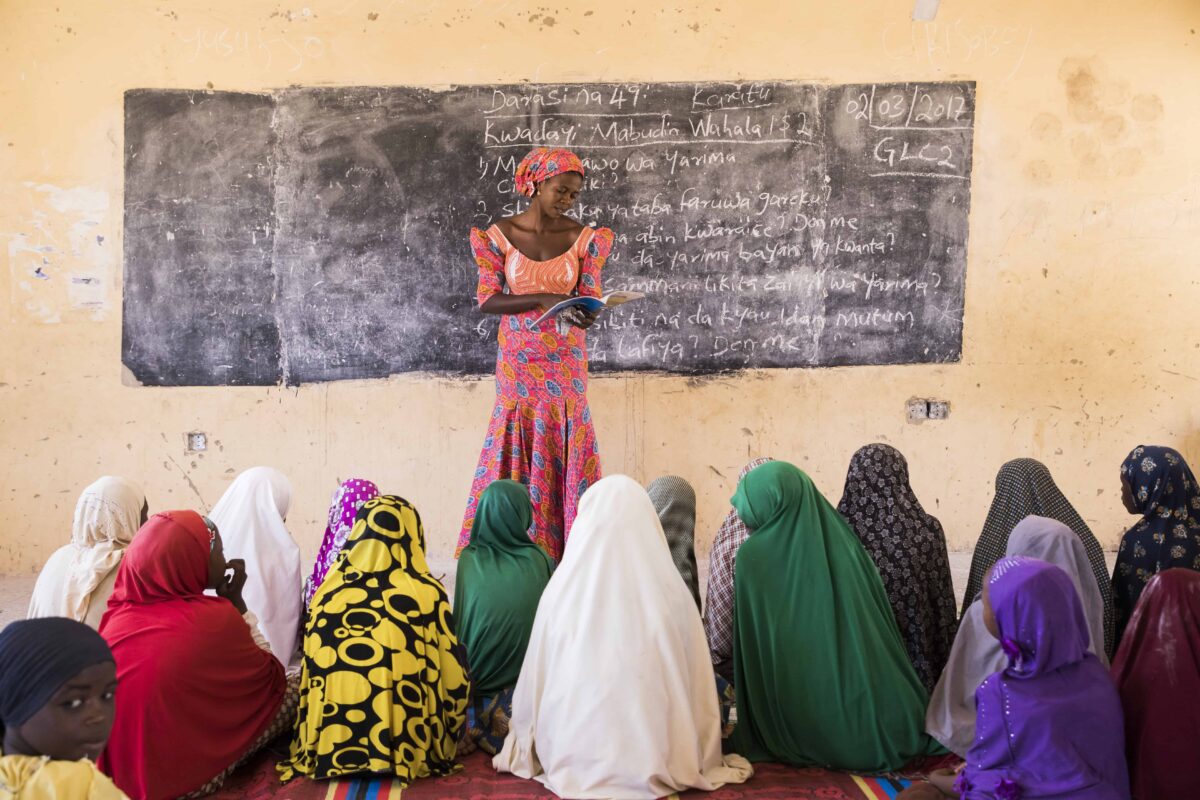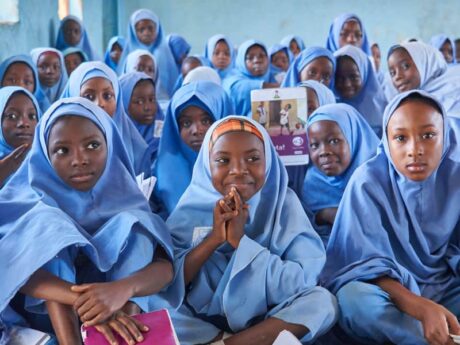Alhaji Bukar Shettima remembers clearly when in 2015 Boko Haram came into his neighborhood in the Borno state capital of Maiduguri. The violent insurgents first attacked a nearby Air Force base before turning their unwanted attention to his home and neighborhood located in front of the military installation.
As a respected teacher and director of a school, he knew that Boko Haram—which roughly translates to “Western education is evil”—would kill him and his family.
Standing outside of Shettima’s home, two young insurgents used their AK-47s to spray his home with bullets that tore through the walls and roof. He and his terrified family kept their heads down and prayed for a miracle.
Soudainement, the two attackers and the rest of Boko Haram stopped their offensive and retreated as the Air Force had mobilized a counter attack. A massive explosion about 50 feet from Shettima’s home killed the insurgents. It was then that the educator and his family could leave their home.
Educators and students in Borno state have been hit the hardest by Boko Haram ongoing offensive against the government and citizens.
“As a result of the insurgency, the education sector—especially the basic education sector—has lost about 530 teachers and over 4,000 à 5,000 classrooms were destroyed,” says Ali Bukar Dogo, Director of School Services on the Borno State Basic Education Board.
With vivid flashbacks of Boko Haram insurgents dragging teachers and students out of a classroom to brutally kill them playing on repeat in a young and impressionable mind, erasing the traumatic and stressful memory seems unattainable.
Susanna Hussein with the Réponse à la crise de l'éducation au Nigeria works closely with crisis-affected and traumatized children and adults with mental, physical and social-emotional effects.
“Some people have lost their beloved ones. Some lost their properties. Some lost their homes; they are displaced,» dit Hussein, who is based in Maiduguri.
Dans tout le nord-est du Nigéria, plus que 2.5 des millions de personnes ont fui leurs foyers, laissant toute une génération d’enfants nigérians privés de leur droit à l’éducation..
Expanding access to education opportunities for vulnerable, displaced students ages 6 à 17, le Réponse à la crise de l'éducation au Nigeria project is responding to the devastation with hope. Par l'éducation, the project helps to provide a sense of stability to traumatized communities.
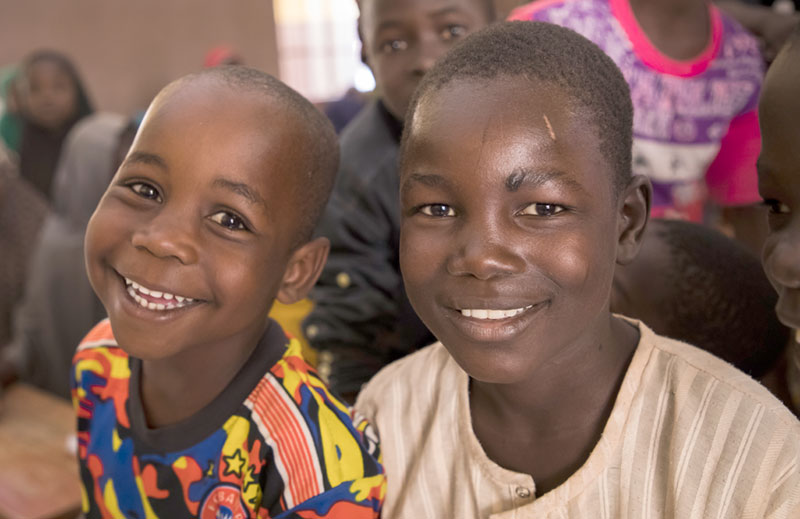
The three-year project is funded by the NOUS. Agence pour le développement international et mis en œuvre par Creative Associates International, le Comité international de secours, le gouvernement nigérian et les organisations non gouvernementales locales.
In close and ongoing collaboration with government, société civile et communautés locales, le projet a atteint plus de 88,000 les enfants dans 1,483 non-formal learning centers with wraparound services like social-emotional learning support for internally displaced out-of-school children in five Nigeria states: Adamaoua, Bauchi, Borno, Gombe et Yobé.
In Borno—the birthplace of the violent extremists—the emotional and physical devastation is overwhelming.
Like in all states where the Education Crisis Response project works, in Borno a baseline assessment was done to test the mental stability of internally displaced teachers and children who were once in formal schools.
“The results found adult teachers—over 93 percent—were mentally destabilized, and the children were more than 50 percent destabilized mentally,” Hussein says of the Borno study. “That informed the reason why Social Emotional Learning is very important in learning through the Education Crisis Response project.”
Social Emotional Learning is one of three pillars of the curriculum in the centres d'apprentissage non formel, which are community-based classrooms that allow internally displaced children to receive state-accredited education.
Developed by the Nigeria Education Crisis Response in collaboration with leading academics, Social Emotional Learning helps traumatized children develop social competencies needed to manage their feelings, establish healthy social relationships and increase their senses of self-esteem, efficacy, motivation and purpose.
“Learning facilitators, using the ‘Healing Classrooms’ model, are trained how to infuse Social Emotional Learning into every aspect of education,» dit Julia Finder, Technical Manager for L'éducation en temps de conflit chez Créatif.
“In addition to social emotional-specific lessons and activities, the facilitators incorporate the same ideas into the broader curriculums to foster a positive and structured learning environment,” says Finder.
In a place like northeastern Nigeria, given the high numbers of children that have been negatively affected by Boko Haram, Social Emotional Learning is an important aspect to creating a sense of normalcy.
“With this concept [Apprentissage socio-émotionnel], I have seen the results of working with people that have been derailed as a result of sudden attacks by insurgencies,» dit Hussein, who has a medical and humanitarian assistance background and has witnessed severe trauma.
Hussein says she feels confident about the future of the teachers and students affected by the attacks.
“It is not the end of life," dit-elle. “As long as one is living, there is hope.”
How Aisha found her future
Fleeing the rugged area of Gwoza city in northern Nigeria, close to the Mandara Mountains between the Nigeria and Cameroon border along the Lake Chad Basin where Boko Haram is notorious for its attacks, 17-year-old Aisha Mohammed and her family escaped when the terrorists attacked their community.
Throughout the conflict—now in its eighth year—hundreds of thousands of Nigerians have migrated to Borno state’s capital city of Maiduguri.
For Aisha Mohammed and her family, building a new life in a new city was uncertain. They have had to overcome significant obstacles before finding stability again.
After settling into small, crowded space, shared by her immediate family and relatives, Mohammed enrolled in one of Education Crisis Response project’s non-formal learning centers for displaced children and has been learning and healing in a safe environment for nearly three months.
“When we are out playing, l forget about everything," dit-elle.
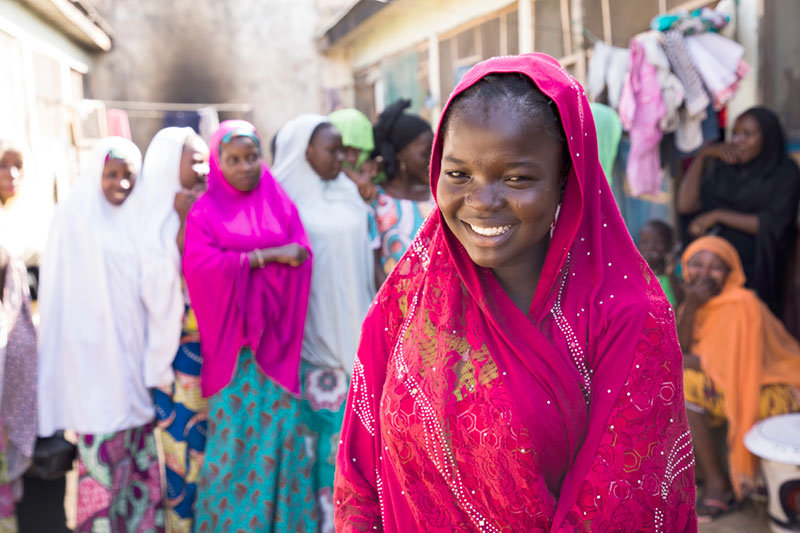
Emotionally scarred by Boko Haram attacks in her home city, she just wants to escape the recent past in her new community. Education is playing a vital role in helping to rebuild her self-confidence and hope for the future.
“My determination is to study," dit-elle.
The Education Crisis Response project’s Social Emotional Learning lessons help traumatized students—both boys and girls—better understand what they have experienced and provides useful tools to cope with complex and conflicting emotions and feelings.
“In school, they taught me how to understand my emotions,” shares Mohammed. "Maintenant, I feel better.”
Through the project’s proven curriculum, she is learning basic education like reading and math, as well as receiving social emotional support which is helping to replace cruel memories of the insurgency’s terror with positive and fulfilling activities.
In each of the more than 1,400 learning centers, classroom sizes are small to ensure greater attention for the students, particularly since students like Aisha Mohammed have been absent from formal education for a year or two.
Despite the hardship, she is looking forward to the future with self-assurance, a newfound excitement and sense of purpose.
“After my studies, I want to help women like myself who were helped,” says Mohammed. “That is my only ambition.”
The teachers who teach students to cope
As tens of thousands of internally displaced families poured into Maiduguri, school teacher Salamatu Ibrahim felt she had to do her part to help them. When she heard about the Education Crisis Response project’s need for facilitators, Ibrahim saw the opportunity to support the out-of-school children.
Though she had years of experience as a professional teacher, she nonetheless had to go through the intensive training to prepare for emotionally traumatized students.
Compared to her traditional classes, these students require a great deal of support.
“You have to be patient with them, and you have to be like a guide to them," dit-elle.
A learning facilitator at Zajiri Primary School with three years of teaching experience with private schools in Maiduguri, Ibrahim explains it requires special care to work with distressed children.
The internally displaced students who arrive to the community-run non-formal learning centers are initially distracted, elle dit. Some may be jumping and running around the classroom, while others are withdrawn and sitting to the side.
“If they are tired, and they want to go home, then they will go home," dit-elle. “But later on, as we teach them Social Emotional Learning, we can slowly control the class and we impart knowledge into their mind that when you’re in the class, you don’t have to have excuses to leave.”
By limiting the size of the classroom to no more than 50 élèves, Ibrahim and other facilitators can more easily help the students to transition into a new routine.
Ibrahim is one of 2,176 learning facilitators trained by the Education Crisis Response project on how to uniquely support traumatized students with specialized activities and interventions, such as Social Emotional Learning.
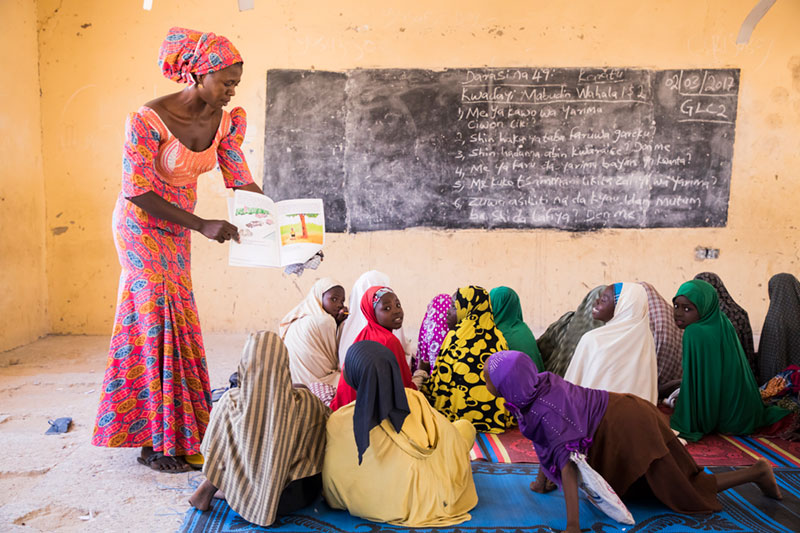
Facilitateurs d’apprentissage, who are trained to be sensitive through the Nigeria Education Crisis Response project, play a crucial role in supporting the mental health and psychosocial well-being of learners.
“In different schools they [enseignants] do beat student," dit-elle, referring to a common practice of corporal punishment, which is strictly prohibited in the non-formal learning centers.
Ibrahim says engaging in stimulating and valuable activities like singing, dancing and playing memory games with her vulnerable students helps them forget the unsettling experiences that they have endured.
She explains, “What you have to do is you have to be part of them, and show them that what they went through is not the end of life.”
Along with creating a safe environment for learning, Social Emotional Learning focuses on helping all students resolve conflicts and challenges, adhere to classroom rules, be socially aware of fellow classmates and be more resilient.
Wakail Mala Buka, master trainer for the Nigeria Education Crisis Response project and lecturer at Kashim Ibrahim College of Education, trains the local learning facilitators like Ibrahim.
In addition to training the learning facilitators, Buka has also lead the charge in providing quality teaching materials in both English and the local language of Kanuri. With the help of other Nigerian education experts from the government, société civile, academia and elsewhere, he has integrated the core Social Emotional Learning competencies into the curriculum.
